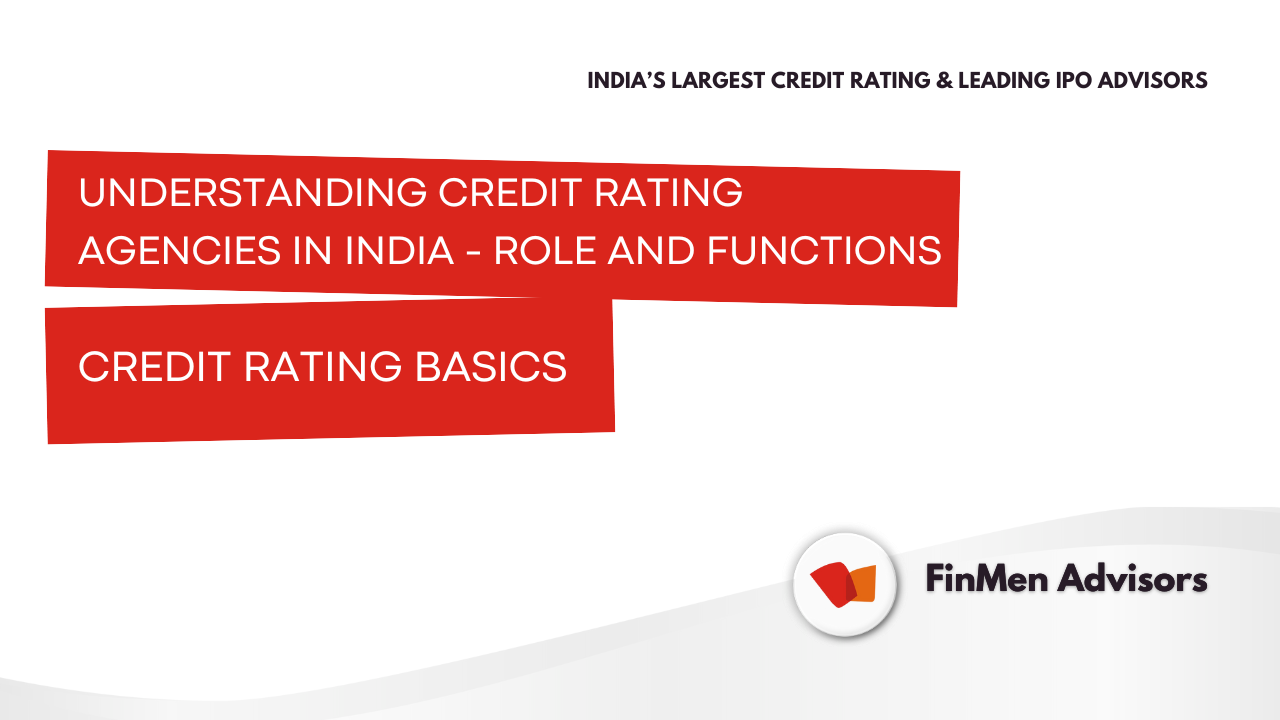Introduction
Credit rating agencies (CRAs) are the backbone of India’s financial markets. They provide independent opinions on the creditworthiness of companies, governments, and debt instruments. For businesses, investors, and lenders alike, CRAs bring clarity and confidence in financial decision-making.
As India’s Largest Credit Rating Advisory & Leading IPO Advisory firm, FinMen Advisors explains the role and functions of CRAs in India, along with why understanding them is essential for every business leader.
What Are Credit Rating Agencies?
Credit Rating Agencies are organizations that evaluate the ability of an entity or instrument to meet its financial obligations. They assign ratings — such as AAA, AA, BBB, etc. — that reflect the relative risk of default.
These ratings are critical for:
- Investors making lending or investment decisions.
- Banks determining loan terms.
- Companies planning to raise funds or issue bonds.
Key Functions of Credit Rating Agencies in India
1. Assessing Credit Risk
CRAs evaluate both quantitative factors (financial statements, leverage, cash flow) and qualitative factors (management quality, governance, industry risks) to determine default probability.
2. Issuing Ratings for Companies and Instruments
They assign ratings not just to companies (issuers), but also to specific instruments such as bonds, debentures, and commercial paper.
3. Monitoring and Surveillance
After a rating is assigned, CRAs continuously track the issuer’s performance and the external environment. Upgrades, downgrades, or outlook revisions are made when conditions change.
4. Enhancing Market Transparency
By publishing methodologies and assumptions, CRAs improve transparency for lenders, investors, and regulators.
5. Supporting Regulatory Compliance
CRAs in India operate under the SEBI (Credit Rating Agencies) Regulations, 1999, ensuring independence, fairness, and accountability.
6. Facilitating Capital Market Growth
Accurate ratings help issuers raise funds at competitive rates while giving investors confidence in pricing risk.
7. SME and Sector-Specific Ratings
Specialized agencies such as the SME Rating Agency of India (SMERA) focus on ratings for small and medium enterprises, helping them build credibility and access credit.
Regulatory Oversight in India
- SEBI Supervision: All CRAs must be registered with SEBI and comply with disclosure, monitoring, and audit requirements.
- Code of Conduct: Ensures transparency, independence, and avoidance of conflicts of interest.
- Rating Committees: Decisions are taken by qualified committees, not individuals.
- Disclosure Norms: Methodologies and assumptions are publicly available to maintain trust.
Challenges Faced by CRAs
- Rating Shopping: Issuers may approach multiple CRAs and prefer the most favorable rating.
- Conflicts of Interest: Ratings are paid for by issuers, raising concerns of bias.
- Lagging Signals: Ratings may not always react swiftly to changing financial realities.
Why Understanding CRAs Matters for Businesses
For companies, understanding CRA processes is not optional — it’s a strategic advantage. It enables:
- Better preparation for rating assessments.
- Stronger financial communication with lenders and investors.
- Improved access to funding and smoother IPO readiness.
FinMen Advisors’ Perspective
At FinMen Advisors, India’s Largest Credit Rating Advisory & Leading IPO Advisory firm, we help businesses align their financial disclosures, governance practices, and strategic narratives with CRA expectations.
With 15+ years of experience, 6,500+ assignments across 31+ industries, and a pan-India presence, we support companies in preparing for rating evaluations, managing reviews, and navigating the complexities of India’s regulatory landscape.
Disclaimer: FinMen Advisors provides advisory services only and does not influence or guarantee any specific credit rating outcome.
FAQs
Q1: Who are the main credit rating agencies in India?
CRISIL, ICRA, CARE Ratings (CareEdge), India Ratings & Research (part of Fitch Group), Brickwork Ratings, and SME Rating Agency of India (SMERA).
Q2: How does SEBI regulate CRAs?
Through the SEBI (Credit Rating Agencies) Regulations, 1999, which mandate disclosures, monitoring, audits, and ethical conduct.
Q3: Do CRAs rate SMEs?
Yes, specialized agencies like SMERA provide ratings tailored for SMEs.
Q4: Can ratings change after being issued?
Yes. CRAs conduct regular surveillance and may upgrade, downgrade, or revise the outlook based on changes in financials or market conditions.
Conclusion
Credit Rating Agencies are central to India’s financial ecosystem. They provide transparency, facilitate capital flows, and maintain investor confidence. For businesses, understanding how CRAs operate is vital to securing better funding opportunities and strengthening market reputation.
FinMen Advisors continues to guide Indian companies across industries in navigating CRA processes and preparing for IPOs, ensuring they are positioned for long-term financial success.


